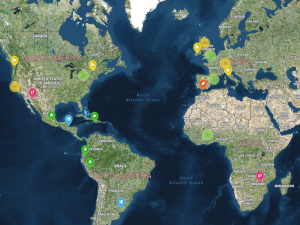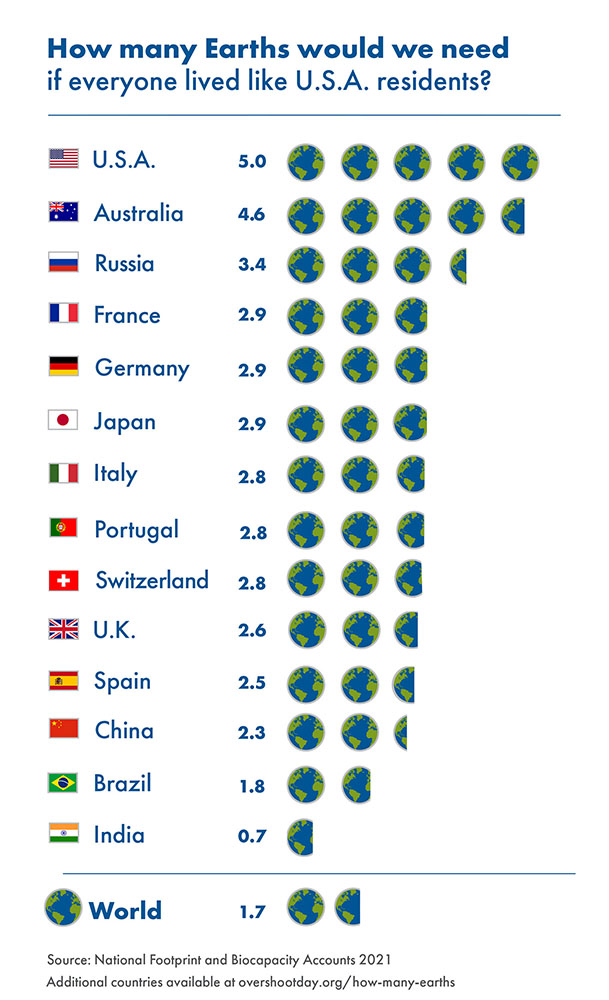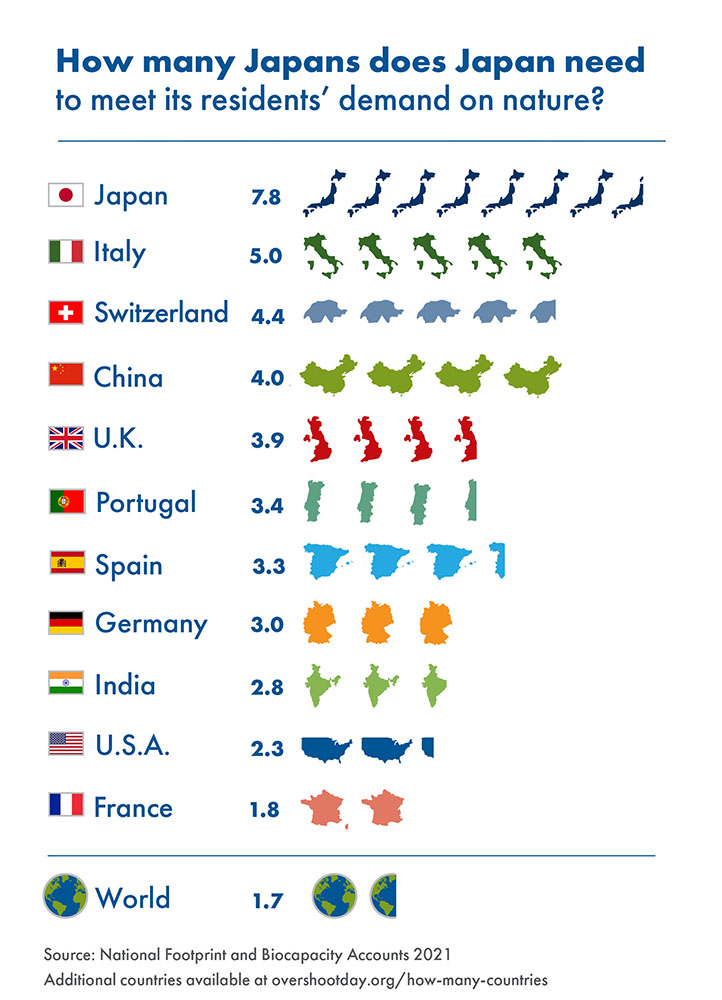

Earth Overshoot Day 2021: July 29th
As Earth Overshoot Day hits, the world and Switzerland are largely unprepared to deal with its consequences, despite many available options.
Embargoed until July 28 2021, 18h00 GMT
SUMMARY: This year’s Earth Overshoot Day has moved back to the pre-pandemic date, suggesting a return to business-as-usual. We are accelerating the depletion of the planet on which every economy depends. This puts all countries at risk, particularly those who are already running an ecological deficit, like Switzerland. However, actionable ways exist to #MoveTheDate of Earth Overshoot Day, not just to combat the climate and biodiversity crisis, but also to protect one’s own country, city, or business, especially in high impact areas such as the infrastructure and construction sector.
GENEVA – JULY 29, 2021 — From January 1st until today, humanity has used as much from nature as the planet is able to renew this entire year. Hence today is Earth Overshoot Day. Overshoot is the underlying cause of most environmental ills from biodiversity loss to deforestation, water and air pollution, fisheries collapse, and greenhouse gas accumulation in the atmosphere, leading to ever wilder weather patterns.
Human demand persistently overwhelming the biosphere may well be the second most severe challenge humanity is facing in the 21st century. The risks imposed by overshoot are topped only by one other risk: that of not responding. Tragically, most cities, corporations, or countries, including Switzerland, fall into this category.
According to National Footprint and Biocapacity Accounts, using the latest UN statistics, which also determine Earth Overshoot Day, the residents of Switzerland use 4.4 times more from nature than Swiss ecosystems can renew. It is like using 4.4 “Switzerlands”. Also, for food, the regenerative capacity of Swiss agricultural areas only provides about 1/3 of Switzerland’s food.
“It is unclear, whether Switzerland has the resolve to prepare itself adequately for the predictable future of climate change and resource constraints, particularly after the CO2 law rejected in June” said Mathis Wackernagel, president of Global Footprint Network. “While good efforts exist in Switzerland such as boosting thermal efficiency of houses or using electricity from hydropower, the country overall is still far from being planet compatible.”
Physical infrastructure and construction contribute significantly to the overall resource demand of economies. This is why we have reached out to forward-looking actors who work on finding solutions that enable us all to live within the planet’s resource budget. We have partnered with Eberhard, a construction company, who recognizes the significant impact concrete construction puts on our planet. In response, Eberhard has developed concrete with circular material use: it reuses up to 100% building waste as aggregate; it also reduces the carbon intensity of concrete through better cement and novel CO2 storage within the aggregate.
Global Footprint Network, together with Eberhard engineers, calculate that replacing conventional concrete around the world with this kind of circular concrete would #MoveTheDate of Earth Overshoot by 2.4 days. This circular concrete is only one of the many #MoveTheDate options already available that Global Footprint Network will be featuring during the 100 Days of Possibility, stretching from Earth Overshoot Day to COP26. This new platform co-sponsored by Eberhard, Schneider Electric and others highlights those innovators who are preparing the solutions needed to weather the upcoming “storm” of climate change and resource constraints. They know that it is preferable to prepare oneself, rather than undermining one’s ability to thrive in the future by just waiting.
There are many ways to #MoveTheDate. Here are some cool options from around the world. Which ones move and inspire you?

Additional Resources
- Eberhard Unternehmungen initiated a climate and resource improved circular concrete solution. More information is available here.
- 100 Days of Possibility launched by Global Footprint Network on Earth Overshoot Day, will reveal opportunities, like the circular concrete solution, to reduce overshoot every day up to the climate COP26 in Glasgow this November.
- data.footprintnetwork.org provides data from the National Footprint and Biocapacity Accounts for all countries from 1961 onwards. The Swiss estimates are available here. These accounts are maintained by York University for Footprint Data Foundation (www.FoDaFo.org)
- Earth Overshoot Day provides al the background explanation for Earth Overshoot Day, including infographics and videos.
- How the Ecological Footprint works.
- Ecological Footprint and Biocapacity Accounting – How the national accounts work.
About ecological footprints
The Ecological Footprint is the most comprehensive biological resource accounting metric available. It adds up all of people’s competing demands for biologically productive areas – food, timber, fibers, carbon sequestration, and accommodation of infrastructure. Currently, carbon emissions from burning fossil fuel make up 60 percent of humanity’s Ecological Footprint.
About ecological overshoot
Since the early 1970s, humanity has been in an ecological deficit. While Switzerland’s biocapacity per person is 36% smaller than the world’s, its Ecological Footprint per inhabitant is about three times as large. The overload cannot continue forever. The effects of this global ecological overshoot can already be observed in the form of deforestation, soil erosion, loss of biodiversity and the accumulation of carbon dioxide in the atmosphere. Running an ecological deficit means that we are not only consuming the annual “interest” on our natural capital, but also depleting it by taking resources from the future to pay for the present. Operating on the ecological advances of future generations is obviously not a successful long-term strategy.
About Global Footprint Network
Global Footprint Network is an international sustainability organisation that is helping the world live within the Earth’s means and respond to climate change. Since 2003 we’ve engaged with more than 50 countries, 30 cities, and 70 global partners to deliver scientific insights that have driven high-impact policy and investment decisions. Together, we’re creating a future where all of us can thrive within the limits of our one planet. www.footprintnetwork.org
Media Contact
Amanda Diep (in California, USA)
amanda.diep@footprintnetwork.org
+1 (510) 839-8879 ext.304
Laetitia Mailhes (in France)
laetitia.mailhes@footprintnetwork.org
+33 650 979 012


